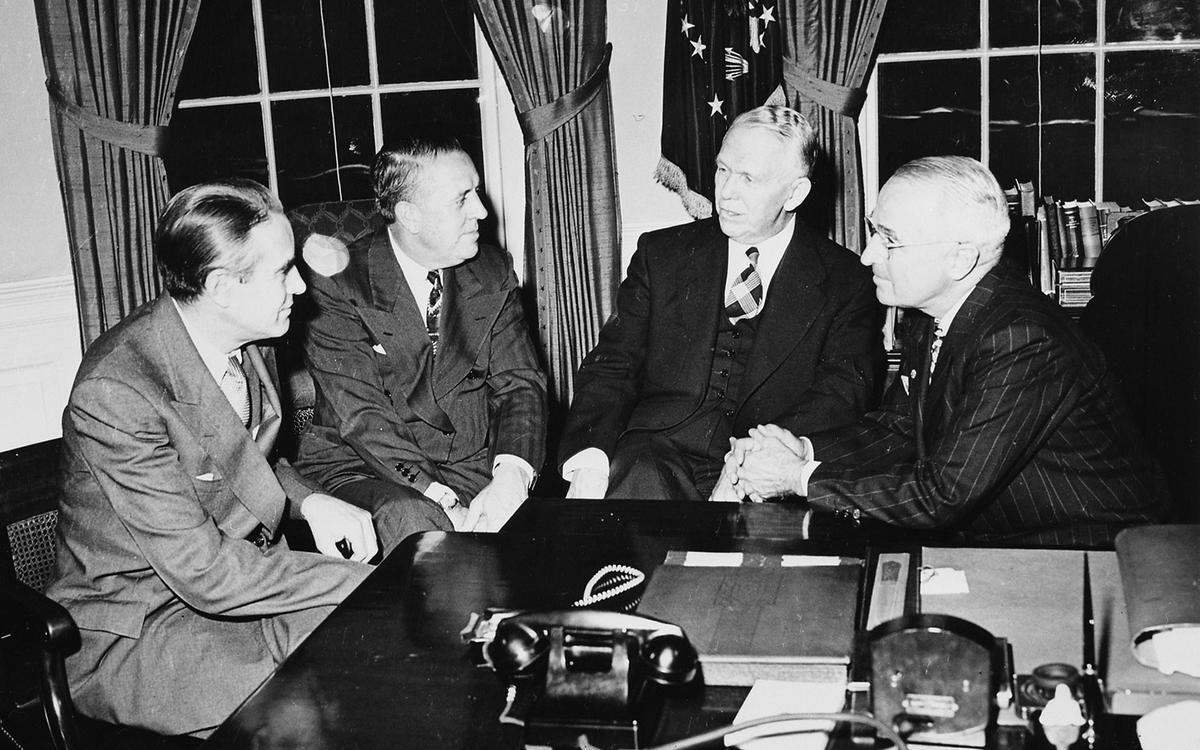
What was the Marshall Plan? The Marshall Plan, officially known as the European Recovery Program, was a U.S. initiative to aid Western Europe after World War II. Why was it important? It aimed to rebuild war-torn regions, remove trade barriers, modernize industry, and improve European prosperity. How did it work? The U.S. provided over $12 billion (around $130 billion today) in economic assistance to help rebuild European economies. Who benefited? Countries like the UK, France, West Germany, and Italy saw significant recovery. What was the impact? It helped stabilize Europe, curb the spread of communism, and fostered strong economic ties between the U.S. and Europe.
The Marshall Plan: A Post-War Lifeline
The Marshall Plan, officially known as the European Recovery Program, was a U.S. initiative to aid Western Europe after the devastation of World War II. It aimed to rebuild economies, stabilize currencies, and foster cooperation among nations.
-
Named after U.S. Secretary of State George C. Marshall, who proposed the plan in a speech at Harvard University on June 5, 1947.
-
The plan provided over $12 billion (equivalent to about $130 billion today) in economic assistance to help rebuild Western European economies.
-
Sixteen countries received aid, including the United Kingdom, France, West Germany, Italy, and the Netherlands.
Economic Impact and Success
The Marshall Plan is often credited with revitalizing the European economy and preventing the spread of communism.
-
By 1952, industrial production in Western Europe had increased by 35% compared to pre-war levels.
-
The plan helped to modernize European industry and business practices, leading to long-term economic growth.
-
It also facilitated the creation of the Organization for European Economic Cooperation (OEEC), which later evolved into the OECD.
Political and Social Effects
Beyond economic recovery, the Marshall Plan had significant political and social implications.
-
The plan fostered political stability in Europe, reducing the appeal of communist parties in countries like Italy and France.
-
It promoted European integration, laying the groundwork for future cooperation that would eventually lead to the European Union.
-
The aid was not just financial; it included technical assistance and the exchange of knowledge, which helped improve productivity and innovation.
Controversies and Criticisms
Despite its successes, the Marshall Plan was not without its critics and controversies.
-
Some argued that the plan was a tool for American economic imperialism, designed to create markets for U.S. goods.
-
The Soviet Union and its allies saw the plan as a threat and responded with their own economic initiatives, such as the Molotov Plan.
-
There were concerns about the conditions attached to the aid, which required recipient countries to adopt certain economic policies.
Legacy of the Marshall Plan
The Marshall Plan's legacy continues to influence international relations and economic policies.
-
It is often cited as a model for foreign aid programs, demonstrating the potential for economic assistance to foster stability and growth.
-
The plan's emphasis on cooperation and integration has inspired similar initiatives in other regions, such as the African Union's development programs.
-
The success of the Marshall Plan helped to establish the United States as a global leader in economic and political affairs, shaping the post-war world order.
The Marshall Plan's Lasting Impact
The Marshall Plan wasn't just a post-war recovery effort; it reshaped Europe. By providing over $12 billion in aid, it helped rebuild economies, stabilize governments, and prevent the spread of communism. This massive financial support led to the rapid industrial growth of countries like Germany and France, laying the foundation for the European Union.
The plan also fostered strong political alliances, particularly between the United States and Western Europe. These relationships have endured, influencing global politics and economics for decades. The success of the Marshall Plan demonstrated the power of international cooperation and economic aid in promoting peace and prosperity.
Understanding the Marshall Plan's impact helps us appreciate the importance of strategic aid and collaboration in addressing global challenges. Its legacy continues to inspire efforts toward economic stability and international unity.
Was this page helpful?
Our commitment to delivering trustworthy and engaging content is at the heart of what we do. Each fact on our site is contributed by real users like you, bringing a wealth of diverse insights and information. To ensure the highest standards of accuracy and reliability, our dedicated editors meticulously review each submission. This process guarantees that the facts we share are not only fascinating but also credible. Trust in our commitment to quality and authenticity as you explore and learn with us.


